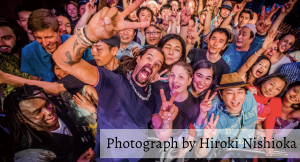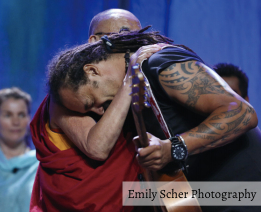Soulrocker: Michael Franti
On a Musical Mission for Health, Happiness and Equality
Michael Franti is a musician, rapper, poet, spoken word artist, singer-songwriter, filmmaker and hotelier who has been a pioneering force in the music industry for three decades. His lyrical activism is a positive force for social justice and peace. His group, The Disposable Heroes of Hiphoprisy, opened for U2 during their 1992-93 Zoo TV Tour. His latest band is Michael Franti & Spearhead, which blends hip hop with funk, reggae, jazz, folk and rock. Its single, “Say Hey (I Love You),” is multi-platinum. From a diverse household with a multiethnic background, Franti has dedicated his life to spreading the joy of music and positivity to millions of people. His audiences have been as diverse as His Holiness the Dalai Lama, prison inmates, the U.S. military and locals on the streets of Middle East war zones — and he’s done the last 18 years of this without wearing shoes. Tokyo Journal Executive Editor Anthony Al-Jamie spoke with Michael Franti about his quest for equality through melody.

TJ: How was it performing at the Honda Center in Anaheim during the 80th birthday celebration of His Holiness the Dalai Lama?
FRANTI: It was amazing to just be there for His Holiness’s 80th birthday. I told the crowd, “Get up off your feet and dance!” and I turn around and there’s His Holiness back there. It was the greatest moment in my rock and roll life! There were so many different people of every walk of life and generations there. He has a very diverse audience.
TJ: Is there a driving force behind what you do as a musician?
FRANTI: I was born to a unique family situation. My mother was Irish, German and Belgian. My birth father is African American and Native American. When I was given up for adoption, I was adopted by the Franti family, who were both second-generation immigrants from Finland. They had three kids of their own and they adopted me and another African American son, so I grew up in this very mixed melting pot of a family. All throughout my life and childhood of trying to understand who I was as a person, not knowing who I was and who my parents were, living in this house of alcoholics — I always felt this affinity with people who felt left out, people who were in some way different. My heroes were athletes … and social leaders — people like Dr. Martin Luther King, Frederick Douglass, Malcolm X, the Dalai Lama and Gandhi. I always wanted to raise my voice about things that were happening in the world, and my first songs were just angry songs about “F*ck the system!” and not responding to the needs of the people. But as I got out into the world and [started] playing music, I realized that you’re much better off not trying to convince people, but trying to connect with people. I learned that through playing in prisons with people saying, “We don’t want to hear songs about how bad life is in prison. We know that. We want to hear things about how much we miss our girlfriend. We want to get up in here and dance so we can forget about these four concrete walls for just an hour.” During my travels through Iraq, Israel and Palestine, and meeting people in real war zones, playing music for people in the street, I heard the same thing — people saying, “We don’t need songs sung about peace. We need songs that just make us laugh and dance and sing and connect and come together and experience our emotions and let our tears and joy out.” So that’s where my roots of music have come from, and today I make music for really one reason — that every single person on this planet deserves to be happy, healthy and equal. That’s the message I try to put into my songs and my show. I own a boutique hotel in Bali [Soulshine Bali] and they try to instill that message … I really feel like right now is the time when the world really needs the voice of more than just politicians. People are out in the street raising their voice to say that we want change and we want things to be different — and we don’t always agree on what the change should be, but I feel like that process of us all raising our voice, no matter if you come from the left or the right politically, is important … I want peace, but I’m not a delusional hippy ... Peace happens when the conditions are such that peace can occur.

TJ: What’s it like playing for prisoners?
FRANTI: When I leave, it feels like I get so much more out of it than the guys I played for. We played in Folsom Prison 37 years after Johnny Cash had played there … the first concert they had had there since Johnny Cash had played. That itself was a big honor! And it was Thanksgiving. Thanksgiving and Christmas are the two worst days in prison — everybody misses their home. One guy said to me, “Prison is like a pressure cooker. If you focus on darkness, it will eat you up and turn you into the most horrible, mean person ever. But if you focus on goodness and you try to do good and better yourself and read and teach other people and find ways to make other people’s days better in here, it will pressure-cook you into the most beautiful person you could ever imagine. You can either do easy time or hard time. It is totally up to you. But you don’t have a choice — you have to do time.” Getting those kinds of nuggets of wisdom — those are the kinds of things I’d expect to hear at the Honda Center from the Dalai Lama. We played San Quentin and they had all the rival factions out on the yard. I was trying to think of a song that would unite all these guys and I’m thinking, “What is one song that everyone here has listened to?” … And we started playing “Sunny Day …” I sang the theme song to Sesame Street and the whole yard starts singing. [Laughs] It’s always rewarding.
TJ: How has your experience been in Japan?
FRANTI: I’ve been there as a tourist and I’ve played shows there four times. Whenever I travel to Bali, which is often because of our hotel, we always try to get [flights with] layovers in Tokyo. I love the culture. I love how interested people are in art and creativity, and how welcoming of different influences into Japanese culture, especially music. They seek it out from all over the world, whether it’s reggae or jazz or hip hop. Especially black American music. There is so much history of that in Japan. I love the food. I love the technology. I love the fashion. During one tour, we got up really early and we went into the Tokyo Fish Market … little trollies scooting around and you turn the next corner and — oops! There’s a guy with a six-foot-long samurai sword! [Laughs] tj
The complete article can be found in Issue #279 of the Tokyo Journal.










